As many readers no doubt know, the Egyptian government on Thursday severed the nation’s ties with the rest of the Internet, in an apparent effort to disrupt political protests calling for an end to the 30-year rule of Egyptian leader Hosni Mubarak.
I’ve been tweeting about new developments as they arise, but I wanted to point to a few of the more dramatic graphs that different sources have drawn up to show the precipitous decline in Internet traffic and connectivity to and from Egypt as leaders there sought to isolate phone and computer networks from the rest of the world.
Arbor Networks put together this graphic, which shows what happens when 80 million people are disconnected from the Web all at once:
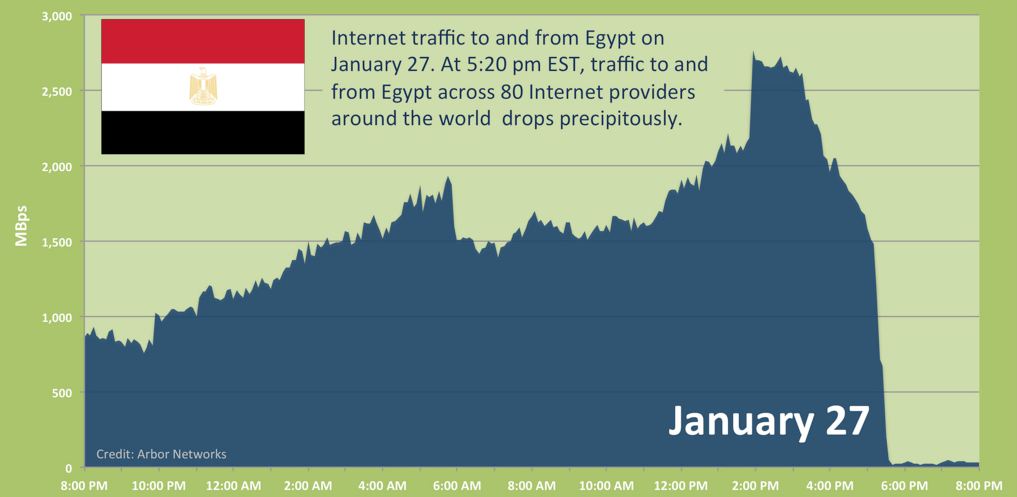 The Extraexploit blog looked at the Internet routing situation around Egypt before and after the disconnection, using the handy (but tricky) tool available here. This Java-based tool charts the routing activity between and among separate networks on the Internet. The first image below shows what some of the main routes to and from Egypt’s various networks looked like just before the incident.
The Extraexploit blog looked at the Internet routing situation around Egypt before and after the disconnection, using the handy (but tricky) tool available here. This Java-based tool charts the routing activity between and among separate networks on the Internet. The first image below shows what some of the main routes to and from Egypt’s various networks looked like just before the incident.
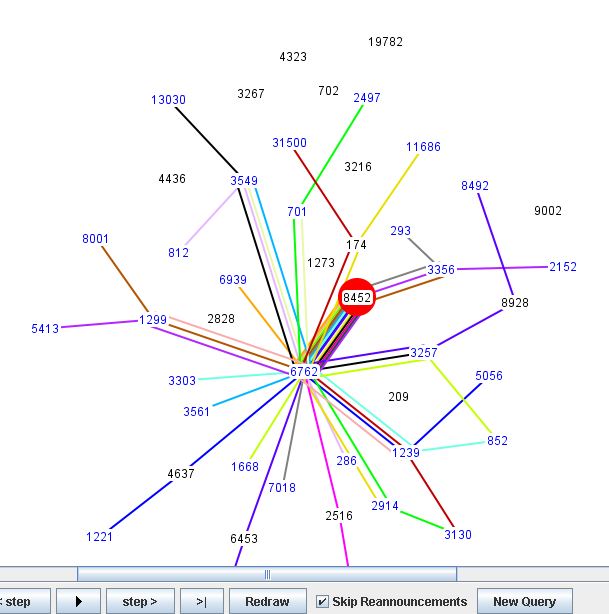 Check out the same route view from today, and it’s clear that Egypt has isolated itself from the rest of the Internet.
Check out the same route view from today, and it’s clear that Egypt has isolated itself from the rest of the Internet.
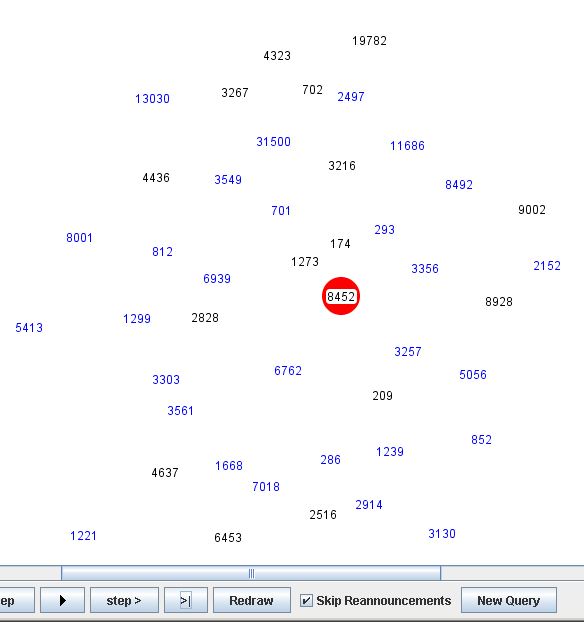 As the folks at Renesys.com wrote, there are still a handful of Internet connections that remain live in Egypt, but the comments to that post suggest that those connections may have been left tightly in the grip of the Egyptian government. Link Egypt, Vodafone/Raya, Telecom Egypt, and Etisalat Misr — all have been blocked, Renesys found.
As the folks at Renesys.com wrote, there are still a handful of Internet connections that remain live in Egypt, but the comments to that post suggest that those connections may have been left tightly in the grip of the Egyptian government. Link Egypt, Vodafone/Raya, Telecom Egypt, and Etisalat Misr — all have been blocked, Renesys found.
In response to the Egyptian government’s crackdown on protesters there, Wikileaks released new State Department cables that reveal human rights abuses and political arrests in the country. Too bad nobody in Egypt is going to be able to see those cables.
Have you discovered a graphic that shows the network isolation of Egypt in a compelling way? Post a link in the comments below, please.
Update, 11:19 a.m.: A reader wrote in with a link to a decent graph maintained by RIPE (French for “European IP Networks”), which shows the disconnection starting on Jan. 27.
Update, Jan. 29, 7:34 p.m. ET: A relatively new data leak prevention firm called Unveillance sent a pointer to their blog post, which chronicled the disconnection of Egypt from a slightly different perspective: The drop in network activity from computer systems within Egypt that were infected with malicious software or controlling other infected hosts.



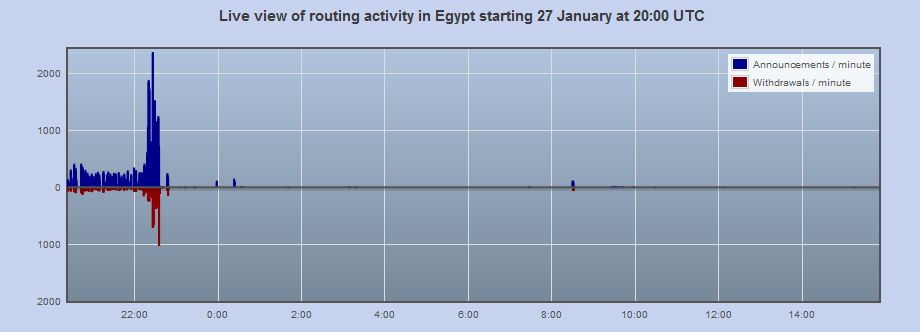
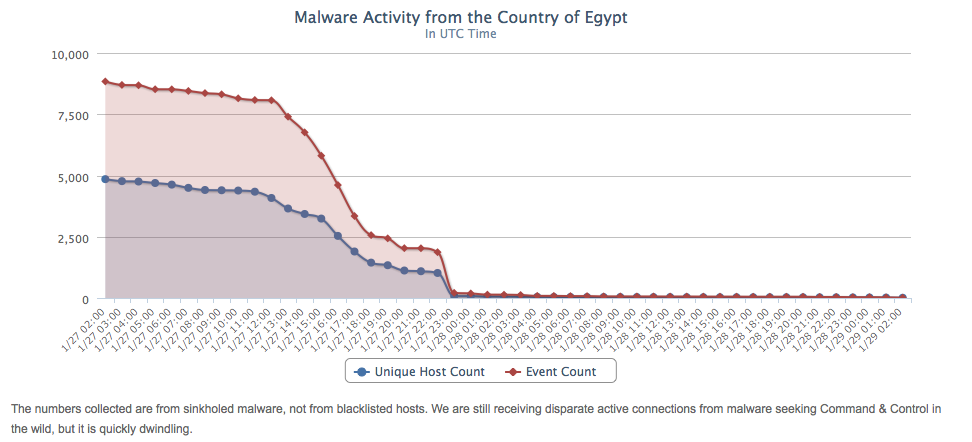

I wonder if Egypt has taken a queue from Iran on this? The Iranians weren’t as successful at shutting off all communication; but then, they didn’t completely shut down all communication for some time either. If my sources are correct
The Iranians hoped that leaving some commo open would reveal dissidents. However the protesters rapidly wised up to this, and started using their own ‘bot-net’ to communicate. Perhaps this is why the new draconian methods are being employed.
I bet the government of Egypt discovers that sawing off your leg to save a toe, doesn’t work either.
This is of great concern in relation to what could happen here.
If Egypt can shut down the Net, I’m that the federal government can do the same here.
Rick is spot on.
Congressional representatives have in recent months proposed the “Internet Kill Switch” for President Obama.
It’s not garnered sufficient support but has generated buzz on Capital Hill.
It is described as a fast response to cyber attacks, but more likely would be used in similar fashion to what is currently being done in Egypt.
Can they go back to dial-up? I mean does this shutdown kill the POTS system there?
The window of opportunity would be short. If Mubarak suspects that dial-up access is demonstrating any measurable benefit to protesters than you will read a follow-up post about all landline phone service being terminated.
From what I’ve read most phone service in Egypt is mobile which makes it trivially easy to shut down (and they have):
http://www.salon.com/technology/dan_gillmor/2011/01/28/egypt_kill_switch
@Vico: in all likelihood yes, if they still use an Egyptian ISP. HOwever if they tried to dial into (say) AOL, long distance? That could still work. Do ISP’s even offer dialup?
Or did you mean landline phone systems? That was still working as of this morning. Many news media outlets had audio interviews via landline phone. That may have since changed.
SiL
Can’t help but think cutting off communications will only escalate things as the people feel more and more isolated and cut off from the world. Doesn’t seem like a very smart move.
U.S. foreign aid distribution to Egypt is difficult to piece together. Here’s a link to one attempt (and, please, do note the discussion of ‘sources’ as well as the ‘sources of error’):
http://www.vaughns-1-pagers.com/politics/us-foreign-aid.htm
The data are in summary form (by year, since 2001) without any accompanying graphics. Egypt is a large recipient of U.S. foreign aid, second only to Israel. Annual U.S. military aid to Egypt has remained steady at approx. $1.3 billion, while U.S. economic aid has dropped from approx. $700-775 million to $200-250 million, roughly by a third.
Brian Unplugged from the Damagelab
Брайан, я же тебе говорил, чтобы бороться с хакерами, нужно СТАТЬ хакером. Тебя очень быстро вычислили.
Mozilla blocked it anyway; my honeypot loves such sites.
nothing dangerous, you can go
I don’t get is. Is this a cyber criminals site that thinks they’ve caught Brian? The kuz’kina mat statement there certainly seems threatening? I probably won’t get any firm answers but I have to say I’m curious.
it’s joke, sir 🙂
Alex is having a little fun. There was a thread on there where they liked to think they caught me posting on their forum. Actually, this is nothing new, and you can see it on several different forums.
Most times, I actually do use a pseudonym when on these forums, but occasionally I will chat people up on crime forums or ICQ and introduce myself as Brian Krebs when I’m doing crime forum research. What’s funny is that I often get the response, “Haha! Good one! Brian Krebs. That’s funny.”
Thanks for the info, guys. I thought it was kind of odd but wasn’t sure. It’s funny how cyber criminals use anonymous forums to protect themselves but the same anonymity that it grants to others opens them to exposure. A little bit related but not too much was an actress talking on a night show about how she jumped into a discussion on a fan site forum using her real name and nobody believed her, either.
Да, пожалуй, я сегодня развлекаюсь. Ну а что, хороший повод – египтяне открутят голову ещё одному упырю, уже Иордания сегодня подключилась, а там, глядишь, и казахстанскому фюреру сломают хребет.
Брайан, у тебя нескромно большое чувство собственного величия. Будь проще и люди к тебе потянутся. Я в интернете уже 12 лет, а про тебя услышал полгода назад. И это не “crime forum”, это форум, где есть очень талантливые люди. В частности, авторы Зевса и SpyEye.
Успехов тебе, Брайан.
lol you know what they say… “On the internet security researchers are Brian Krebs, the scammers are Brian Krebs, and the children are still FBI agents.”
Also check the folks at BGPmon.net. Latest update:
Update (Jan 28 6:36 PM UTC)
At this point only 239 Egyptian networks are reachable, this means that 91% of the Egyptian routes are unreachable. Noor networks remains the only provider that seems to be unaffected by this.
Vodafone has confirmed on their website, that they have been instructed to shutdown services in parts of the country
http://bgpmon.net/blog/?p=450
From the pictures so far, it appears that most of the protesters are 20 somethings. among whom there is endemic unemployment and no prospect of a middle class existence in their homeland. They’re already furious at the Mubarak oligopoly, and Tunisia is the spark that ignited the tinder.
Shutting down the WWW for any length of time will make life very difficult for the enfranchised middle class who depend on the net as middle class folk worldwide depend on it, not to mention the cell phone/texting networks which were also blacked out. They’ll be infuriated if denied access for any length of time, and if they turn on Mubarak, he’s finished.
Brian,
Thanks for reporting on this. It is important, as freedom loving people, that we stay informed and inform others of such situations. Please do stay on top of it with frequent blog posts.
An internet kill switch is a great idea if you want to isolate your country’s network from external attackers.
Ask the folks in the Iranian nuclear program or the governments of Belarus and Georgia if they want more connectivity to the big bad world when the hard rain comes down…
I found it a bit of shock and awe in some of my regularly reported spam and port knocker geolocating out SE Asia suddenly drop out from sight when Egypt went dark.
Be interesting when, if, they come back onto the net.
Be interesting if the worldwide routing is working OK for that region as designed and if other sites are seeing the impact of traffic (specifically spam & botnets) rerouting around this massive regional outage
Likely that regional routing is adapting quite well.
A couple of years ago they got some practice:
http://www.marketwatch.com/story/third-undersea-cable-reportedly-cut-between-sri-lanka-suez
They might win this battle, but they’ve damaged themselves badly in the process. Business relies on the internet. The young unemployed people can make a scene in the streets, and nothing will really change. But if the people who control the flow of money in the country have lost confidence in the leader of the government because their means of conducting business is abruptly cut off, they will quietly start grooming his successor.
Interesting about collateral impacts in SE Asia of the cutoff in Egypt. I would think that would get a workaround ASAP.
I think it is still too soon to tell what the outcome of this will be. It would be horrible if pro democratic demonstrations resulted in Islamic fundamentalists coming into power, BUT that is still way too soon to project — as is the downfall of the current regime.